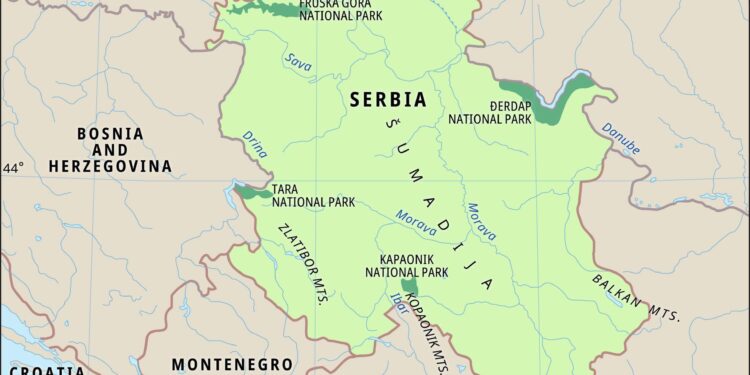Serbia has acknowledged that Russian operatives operated a paramilitary training camp within its borders, with the aim of interfering in Moldova’s upcoming elections, according to reports from Euromaidan Press. The revelation marks a significant escalation in Moscow’s covert efforts to influence political dynamics in Eastern Europe. Serbian authorities, under increasing international scrutiny, have confirmed the existence of the camp as part of a broader investigation into foreign interference and hybrid threats targeting Moldova’s electoral process.
Serbia Confirms Russian Operatives Established Paramilitary Camp Targeting Moldova Elections
Serbian authorities have publicly acknowledged the existence of a clandestine paramilitary training facility operated by Russian agents on their soil. This camp, reportedly aimed at influencing the upcoming elections in Moldova, has raised alarms among European security agencies. According to official statements, operatives linked to Russian intelligence were involved in recruiting and training individuals with the explicit purpose of destabilizing Moldova’s democratic processes. The revelation underscores the growing concerns over election interference in Eastern Europe and highlights the strategic importance Moscow places on the region’s political landscape.
The complex network uncovered involved several critical components:
- Recruitment of local and foreign fighters to prepare for covert operations.
- Logistical support including weapons and communications training.
- Coordinated attempts to spread disinformation and intimidate voters.
| Aspect | Details |
|---|---|
| Camp Location | Undisclosed site in Serbia |
| Operatives | Russian intelligence agents |
| Target | Moldova parliamentary elections 2024 |
| Reported Activities | Paramilitary training, disinformation |
Analysis of Regional Security Implications and Political Destabilization Risks
The revelation that Russian operatives utilized a paramilitary camp in Serbia as a base to interfere in Moldova’s electoral process underscores a growing pattern of covert influence tactics in Eastern Europe. This development heightens concerns over the fragile equilibrium within the region, where geopolitical rivalries are increasingly played out through proxy agents and hybrid warfare strategies. Neighboring countries, already vigilant against destabilization attempts, face amplified risks as such clandestine operations blur the lines between direct conflict and subversive interference.
Key regional security implications include:
- Escalation of mistrust among Balkan states and between pro-Western and pro-Russian factions.
- Heightened readiness of security forces across borders to deter paramilitary activities and electoral sabotage.
- Potential for spillover violence that could exacerbate ethnic and political tensions, especially in contested zones.
The interplay between Russia’s clandestine campaign and local political dynamics also poses a severe threat of political destabilization. Moldova, caught between its aspirations toward European integration and Russia’s strategic interests, risks internal fractures that could be exploited by external actors. The destabilization matrix is complex, involving:
| Factor | Impact |
|---|---|
| Electoral Interference | Undermines democratic legitimacy and fuels political polarization |
| Paramilitary Presence | Increases chances of violent outbreaks and destabilization |
| Ethnic Tensions | Provokes renewed grievances, complicating national unity efforts |
| Foreign Influence | Challenges sovereignty and regional security cooperation |
Recommendations for Strengthening Election Integrity and Enhancing Cross-Border Intelligence Cooperation
To effectively safeguard electoral processes against foreign interference and paramilitary disruptions, it is imperative that governments intensify collaboration across national borders. Establishing real-time intelligence-sharing frameworks between neighboring states can provide early warnings about covert operations aimed at destabilizing elections. This necessitates the creation of joint task forces equipped with state-of-the-art surveillance and cybersecurity capabilities, facilitating prompt identification and neutralization of hostile actors before they infiltrate sovereign political arenas.
Equally important is the harmonization of legal standards and operational protocols to deter cross-border malicious activities. Key recommendations include:
- Unified legislation targeting foreign paramilitary training camps and election sabotage.
- Regular intelligence exchange exercises focusing on emerging hybrid threats and disinformation campaigns.
- Investment in joint cyber defense initiatives to detect and thwart digital interference.
- Community engagement programs aimed at increasing public awareness around election security.
| Priority Area | Recommended Action | Expected Outcome |
|---|---|---|
| Intelligence Sharing | Establish cross-border rapid alert systems | Faster threat detection and response |
| Cybersecurity | Deploy coordinated cyber defense teams | Mitigation of digital election interference |
| Legislation | Harmonize laws against paramilitary activities and sabotage | Consistent legal framework for prosecution and deterrence |
| Community Engagement | Implement public awareness campaigns on election security | Increased public vigilance and reduced manipulation |
In conclusion, a multi-layered approach combining intelligence cooperation, legal harmonization, technological investment, and community involvement is essential to maintaining the integrity of democratic elections in the face of evolving external threats.
Let me know if you would like me to help transform the content further, such as converting it to a different format or summarizing key points!
The Way Forward
The revelation that Russian operatives managed a paramilitary camp on Serbian soil to influence Moldova’s elections marks a significant escalation in regional geopolitical tensions. As investigations continue, the incident underscores the persistent challenges facing Eastern European countries as they navigate foreign interference and the complexities of security in a fraught geopolitical landscape. Stakeholders in Serbia, Moldova, and the broader international community will be closely monitoring developments, emphasizing the need for vigilance and cooperation to safeguard democratic processes in the region.
















